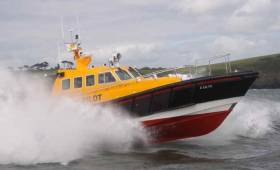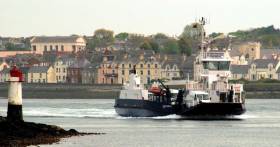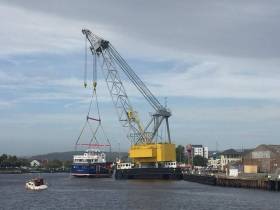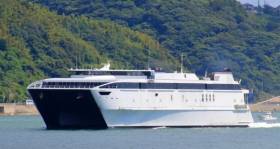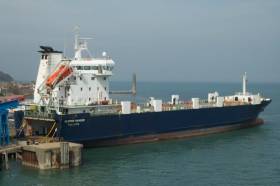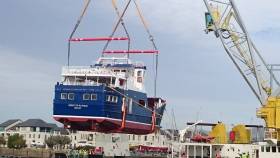Displaying items by tag: Ports & Shipping news
Tanker Operator Ardmore Appoints New Financial Controller
#Appointment - Ardmore Shipping Corporation which relocated its Principal Operating Office from Mahon outside Cork to the city centre in recent months, has appointed Jorge Lavin as the company's Financial Controller.
In his new position, Jorge is closely involved in helping Ardmore (operators of chemical and product tankers) to meet its financial reporting requirements. In addition to preparing internal reporting for Ardmore’s senior management team and Board of Directors, and managing the Ardmore’s cash management system.
Jorge trained as a Chartered Accountant with EY where he worked with multinational clients including Telefonica and Teekay. Following EY, he joined the Ferrovial Group, one of biggest construction companies in the world.
While at Ferrovial, he held roles in Group Financial Control and as Head of Financial Compliance and Group Financial Controller of Heathrow Airports Holdings (formerly BAA). He was most recently the Group Financial Controller of Ferrovial US. Jorge is also qualified in Financial Risk Management and is a Certified Public Accountant.
UK Immigrant Controls Could Shift to Irish Ports to Avoid 'Hard Border'
#IrishBrexitPorts- Irish ports and airports is where the UK are proposing to transfer frontline immigration controls to, writes The Irish Independent in measures to avoid enforcing a ‘hard border’ between the North and the Republic.
Northern Ireland Secretary, James Brokenshire, has said that London and Dublin will work to strengthen Ireland’s external borders to prevent illegal migration to the UK. The move would come into effect once the UK leaves the European Union.
Speaking to The Guardian, Mr Brokenshire said there was now a “high level of collaboration on a joint programme of work” between Ireland and Britain. “We have put in place a range of measures to further combat illegal migration working closely with the Irish government,” he said.
“Our focus is to strengthen the external border of the common travel area [CTA], building on the strong collaboration with our Irish partners.” He also stressed that Brexit would not destabilise Northern Ireland’s power-sharing institutions, and would not provide dissidents with a propaganda boost.
“There is no reason to think that the outcome of the referendum will do anything to undermine the rock-solid commitment of the UK government and the people of Northern Ireland to the settlement set out in the Belfast agreement and its successors," he added.
Questions over the north-south border have been rampant since the UK voted to leave the EU, with fears that border controls would have to be put in place to control immigration.
Such measures could be seen as a violation of the Good Friday agreement. But shifting the focus of immigration controls to Rosslare Europort and Dublin Airport could help to avoid such a violation.
The proposed measures would be mainly aimed at non-Europeans wishing to enter the common travel area between Ireland and Britain.
For more the newspaper has a report here.
Conference: Pilotage Today… & Into the Future
#Pilotage - The Irish Institute of Master Mariners, together with the Port of Cork, NMCI Ports and the Nautical Institute (Irish Branch) are to host a major conference on Pilotage.
The two-day conference at the National Maritime College of Ireland takes place on 3-4 November.
A range of presentations, to include a major P & I Club, serving pilots and a serving shipmaster with Maersk promises to be a most interesting two days. It is to be hoped that all pilots around Ireland who are free to do so, will attend and contribute.
Equally, the conference will be of interest to Harbour Masters and Pilotage Superintendents, as well as serving shipmasters.
Delegates fee is €50, to include all meals and an evening buffet.
Closing date for booking is next, week on Thursday, 20 October.
Registration at next month’s conference is 12 noon Thursday, 3 November. Conference concludes following day at 14.00 Friday, 4 November.
For further details and limited number of accommodation rooms at special conference rates, contact: [email protected]
Report by Irish Exporters Reveals €140bn in Turnover Ahead of Brexit
#ExportBrexit - In the 'Top 150 Born in Ireland' report, according to the Irish Exporters Association (IEA), leading companies in that sector generated around €140bn in turnover last year.
The Investec-backed study lists Ireland's largest indigenous companies by sales with building materials group CRH topping the list.
Collectively the entire list reported €139.5bn in sales with businesses in the construction and engineering sector amounting to the second-largest proportion of contributors.
Investec head of treasury Aisling Dodgson said the success of indigenous firms can sometimes be overlooked in what is becoming a more globalised market.
For more findings of the report in the Irish Examiner, click here
New Strangford Lough Car Ferry to Make Autumn Debut
#NewbuildFerry - A new £6m double ended carferry for Strangford Lough, Northern Ireland as previously reported is due to enter service this autumn, writes Jehan Ashmore.
The Department for Infrastructure (DfI) has established a project for the delivery of two ferries – one for the Ballycastle, Co. Antrim to Rathlin Island ferry launched last week by Arklow Marine Services. The second ferry is for the Strangford Lough Ferry Service, following a contract from the DFI for the 28 vehicle/260 passenger newbuild was awarded to Cammell Laird, Birkenhead.
When in service, the new ferry named MV Strangford II will alternate with MV Portaferry II to service the route between Strangford and Portaferry, Co. Down. The 10 minute service is operated on a half-hourly schedule.
The DFI has responded to Afloat.ie on what awaits the fate of MV Strangford (built in 1969 by Verolme Dockyard, Cork) and the passenger only MV Rachlyn. The DFI commented that they have engaged the Disposal Services Authority (DSA) to arrange disposal of both vessels, which will no longer be required when the new replacement ferry, Strangford II comes into operation.
The DSA has invited expressions of interest to arrive by 13 October and it is anticipated that the vessels will be sold later this year.
Shipping Review: Waterford’s 2020 Port Vision, Arklow’s Newbuildings & World Maritime Debate
#ShippingReview - Jehan Ashmore reviews the shipping scene from among stories of recent weeks.
Waterford Harbour Board celebrated its bicentenary and launched the port's business plan up to 2020 with a strategy for growth at the Belview facility through a €7 million capital investment project.
The second of 10 newbuild cargoships built to a new design for Arklow Shipping, yard No. 425 Arklow Cape is to be launched on 21 October from Ferus Smit in the Netherlands. Also in the same country, another newbuild at a more advanced stage, Arklow Valley began first sea trials.
While in the same week back home at ASL’s headquarters in Arklow, a rare example of an Irish built carferry, Spirit of Rathlin was completed from Arklow Marine Services.
The Tyrrell family behind shipowners ASL, are in their fifth generation of building vessels, which saw the 6 vehicle /140 passenger car ferry lowered into the River Avoca by giant floating crane barge, Lara 1.
The International Maritime Organisation (IMO) World Maritime Day included a debate (click to listen) on ‘Global Shipping’s Future Challenges’ The debate was held at the IMO headquarters on the banks of the River Thames, London.
ICG Extend Charter of Fast-Ferry Westpac Express
#ExtendedCharter - Irish Continental Group has announced today, following their statement issued on 2 June this year, the charter to Sealift LLC of the High Speed Craft "Westpac Express" for a further fixed period of 12 months to October 2017.
Sealift LLC in turn have chartered the Vessel to Military Sealift Command, a U.S government organisation. The charter is subject to usual US government procurement regulations.
The vessel was built in 2001 by Austal Ships, Australia. It has a gross tonnage of 8,403 tonne, passenger capacity of 900 and a car carrying capacity of 182 units.
Seatruck ‘Highly Commended’ at Lloyds Global Awards
#AwardResults - Seatruck Ferries, the Irish Sea's only operator dedicated to unaccompanied ro-ro freight, was last night piped by the post in a category at the Lloyds List Global Awards, writes Jehan Ashmore.
The ‘Company of the Year’ award went to French container operator CMA CGM. However, Seatruck were 'Highly Commended' by the judges at the event regarded as the 'Oscars' of the worldwide shipping industry.
Seatruck part of the Danish owned Clipper Group, this year celebrated its 20th anniversary. The freight ro-ro operator has a network of three routes: Dublin-Liverpool, Dublin-Heysham and Warrenpoint-Heysham and as reported only this month launched a new Dublin-Bristol route.
The Port of Bristol is a major hub for UK car imports and the new route provides manufacturers an alternative option to enter the Irish marketplace.
Afloat.ie has identified Portbury as the location used as part of the Port of Bristol that also operates Avonmouth. The vessel deployed can also be revealed as the Clipper Ranger (165 unit capacity) which operates the new service with a weekend round trip. Otherwise the ‘R’ class ro-ro would be left idle in between serving routine Dublin-Heysham sailings.
IMO World Maritime Day Forum Debate (Live Streaming Today 15.15hrs)
#WorldMaritimeDay - The International Maritime Organisation (IMO) World Maritime Day Forum takes place today and the theme for 2016 is "Shipping: Indispensable to the World".
The IMO forum will also today include a debate ‘Global Shipping’s Future Challenges’ at 15.15hrs held in the IMO headquarters, London.
You are invited to a live streaming of the debate, so click HERE and submit to the remote participation in order to view the event. To also take part via Twitter use the following handle and hashtag: @IMOHQ #WorldMaritimeDay
Julian Bray is the moderator and panellists are: Karin Orsel, Alistair Lindsay, Rear Admiral Chris Parry CBE and Hassiba Benamara
The theme of the debate was chosen to focus on the critical link between shipping and global society and to raise awareness of the relevance of the role of IMO as the global regulatory body for international shipping. The importance of shipping to support and sustain today's global society gives IMO's work a significance that reaches far beyond the industry itself.
According to the United Nations Conference on Trade and Development (UNCTAD), around 80 per cent of global trade by volume and over 70 per cent of global trade by value are carried by sea and are handled by ports worldwide. These shares are even higher in the case of most developing countries. Without shipping the import and export of goods on the scale necessary to sustain the modern world would not be possible.
Seaborne trade continues to expand, bringing benefits for consumers across the world through competitive freight costs.
There are more than 50,000 merchant ships trading internationally, transporting every kind of cargo. The world fleet is registered in over 150 nations and manned by more than a million seafarers of virtually every nationality.
Over the past 50 years and more, IMO has developed and adopted a comprehensive framework of global regulations covering maritime safety, environmental protection, legal matters and other areas. Under this regulatory framework, shipping has become progressively safer, more efficient and more environment-friendly.
Rare Launch in Irish Shipbuilding of Car Ferry at Arklow for Rathlin Island
#FerryLaunched – A newbuild and that of a car ferry, which is rare in Irish shipbuilding, was launched at Arklow, Co. Wicklow yesterday, writes Jehan Ashmore.
The 6 vehicle / 140 passenger ferry, Spirit of Rathlin was launched from Arklow Marine Services, which involved the Belfast registered newbuild hoisted off the quayside by a floating crane, Lara 1 and lowered into the River Avoca. The self-propelled crane barge was chartered to the the port for the operation and is more commonly known as the former Mersey Docks & Harbour Board's Mersey Mammoth.
Spectators lined the banks opposite North Quay, to witness the proud moment for the boatyard which was awarded the contract by Northern Ireland’s Department for Infrastructure (DFI). The DFI is still in the process of evaluating the bids for tenderers as previously reported to operate the new Rathlin ferry between the island off Co. Antrim and Ballycastle.
Arklow Marine which is owned by the Tyrrell family, now in their fifth generation of running the marine engineering business synominous with Irish shipbuilding that can trace its origins to 1864. Among the most famous of vessels launched was the State's first custom built sail-training ship, the brigantine, Asgard II built in 1981.
Asides car ferry building, the yard have also designed and constructed vessels including aluminium catamarans, amphibious vessels, trawlers, tugs, and workboats. They also carry out conversion, repair and refit work.
In more recent years AMS has branched out into specialist newbuilds for the offshore energy sector, with the completion of Wind Farm Service support vessels for the UK market.




























